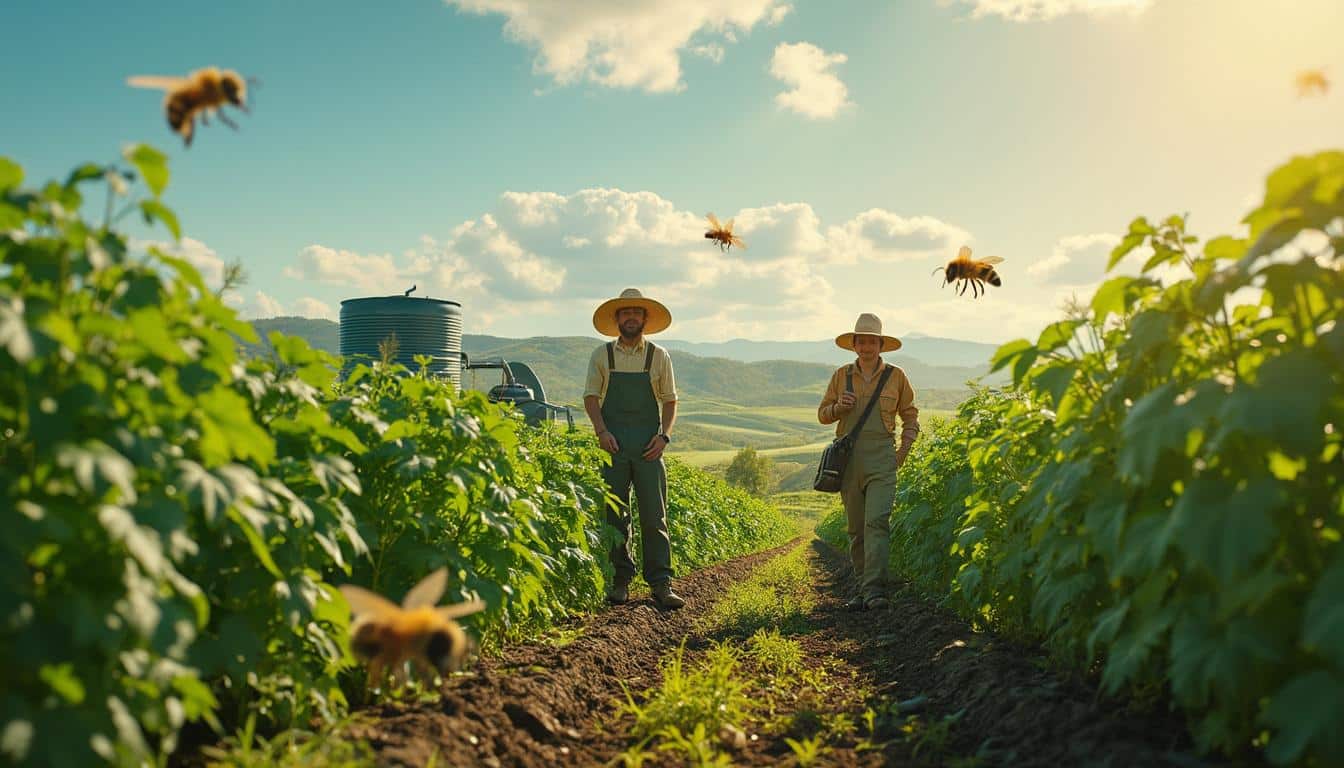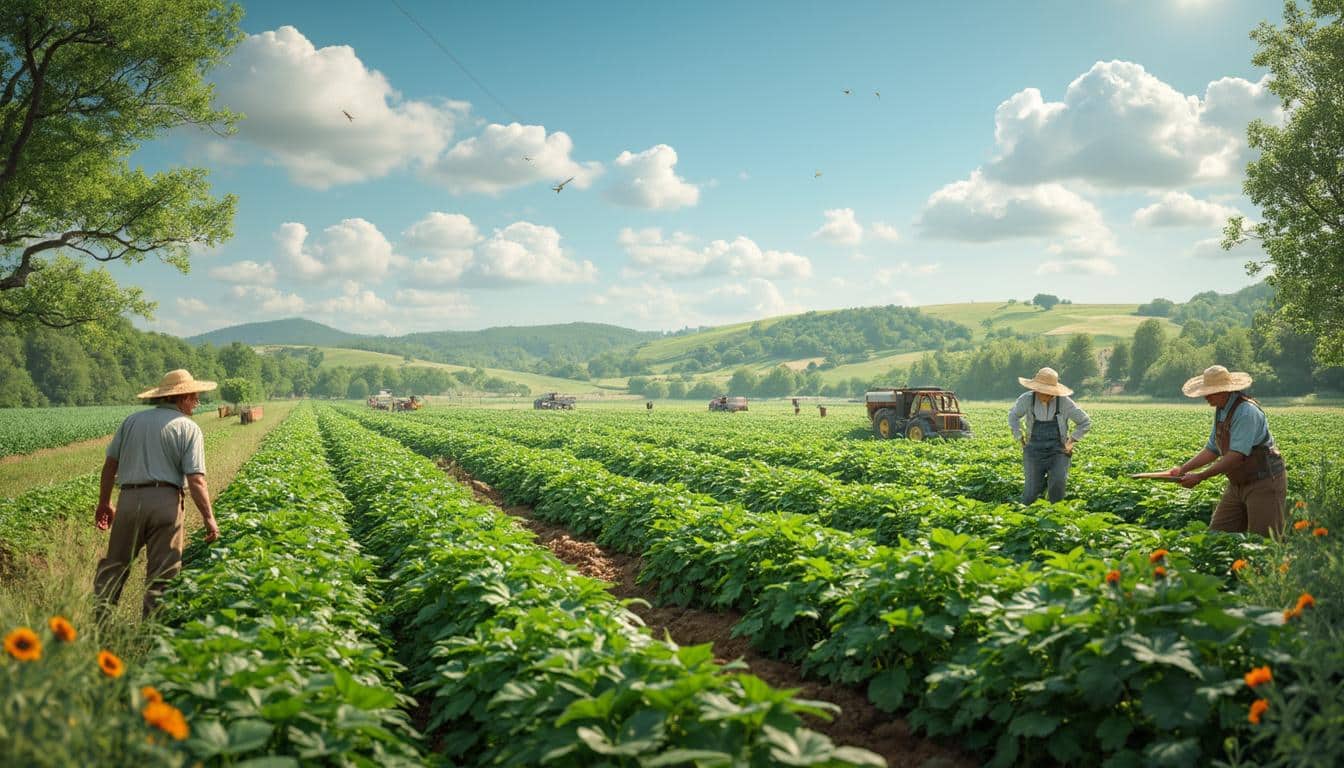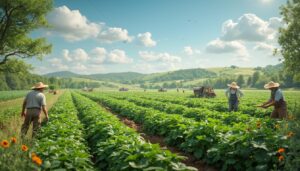« `html
Ever wondered how spuds can outsmart Mother Nature?
Meet Samuel Allix, the potato whisperer.
He’s turning dirt into data-driven dreams.
In the heart of Aquitaine, Samuel Allix is revolutionizing potato farming with a dash of high-tech wizardry. Gone are the days of guesswork and thirsty crops; instead, Samuel leverages weather stations and sensors to orchestrate a symphony of water conservation. Covering a sprawling 280 hectares, his fields are monitored by six state-of-the-art stations that keep tabs on everything from pluviometry to soil moisture. Thanks to the Groupement de recherche sur les cultures, Samuel receives bi-weekly forecasts that help him fine-tune his irrigation strategy. With the flick of a finger on his phone, he controls the telemanaged pivots, ensuring each potato plant gets just the right amount of H2O. This savvy approach not only slashes water usage by up to 30% annually but also sneaks in a reduction of phytosanitary products, making his farming both efficient and eco-friendly. As technology continues to evolve, one can only imagine the automated wonders awaiting Samuel’s potato patches.

Table of contents
Togglehow technology is transforming potato farming in Gironde
In the picturesque region of Gironde, potato production is undergoing a revolution, thanks to innovative technologies that promote sustainable water management. Farmers like Samuel Allix are at the forefront of this transformation, leveraging a suite of advanced tools to optimize irrigation and conserve water. By integrating weather stations, soil sensors, and telemanagement systems, Allix successfully reduces water consumption by up to 30% annually. These technologies provide real-time data on pluviometry, air and soil moisture, and the growth stage of potato crops, enabling precise water application tailored to the plants’ needs.
The use of six strategically placed weather stations across 280 hectares of production allows for comprehensive monitoring. This data-driven approach not only conserves water but also enhances crop yields and quality. Collaborating with the Groupement de recherche sur les cultures et techniques agricoles des sols forestiers d’Aquitaine (GRCETA-SFA), Allix receives bi-weekly forecasts that inform his irrigation strategies. Such partnerships are crucial in disseminating best practices and supporting sustainable agriculture in the region.
For more insights into how technology is revolutionizing agriculture, check out this article on new frontiers in today’s world.
how does telemanagement enhance irrigation efficiency?
Telemanagement systems have become a game-changer in the realm of irrigation management. Samuel Allix utilizes these systems to control irrigation pivots remotely via his smartphone, ensuring that water is delivered precisely when and where it is needed. This level of control minimizes water waste and maximizes efficiency, as irrigation schedules can be adjusted based on real-time data from soil sensors and weather forecasts.
By automating irrigation, farmers can respond swiftly to changing weather conditions, such as unexpected rainfall or heatwaves, thereby avoiding overwatering or underwatering their crops. The integration of artificial intelligence (AI) with telemanagement is the next frontier, promising to create fully autonomous irrigation systems that require minimal human intervention. This advancement could lead to even greater water savings and further increase the sustainability of potato farming.
Discover the potential of AI in agriculture by visiting this insight on AI advancements.
what role does data collection play in sustainable farming?
Data collection is the backbone of modern sustainable farming practices. In Gironde, farmers like Samuel Allix rely on comprehensive data gathered from soil moisture sensors, weather stations, and crop monitoring tools to make informed decisions about irrigation and other farming activities. This data enables the precise allocation of water resources, ensuring that each potato plant receives the optimal amount of moisture needed for healthy growth.
The collaboration with GRCETA-SFA provides farmers with valuable insights derived from reference plots, which serve as benchmarks for irrigation practices. These reference plots allow farmers to compare their data against standardized metrics, ensuring that their water usage aligns with sustainable practices. Additionally, by analyzing historical data, farmers can predict future water needs and adjust their strategies accordingly, further enhancing water conservation efforts.
Learn more about innovative data-driven approaches in agriculture through this food innovation exploration.
how does water management impact environmental sustainability?
Effective water management is crucial for environmental sustainability, particularly in agriculture. In Gironde, the region’s average pluviometry surpasses the national average, yet during dry summers, efficient water use becomes imperative. By adopting optimized irrigation systems, Samuel Allix reduces water consumption by 10 to 30% each year, significantly lowering his environmental footprint. This not only preserves precious water resources but also reduces the dependency on groundwater extraction from aquifers.
The water used for irrigation in these systems comes from a surface aquifer known as the « sables, » which is rich in iron and not suitable for drinking without costly deferrization. By utilizing this non-potable water source, farmers avoid competition with potable water supplies, ensuring that drinking water remains accessible for local communities. Additionally, the reduced application of water diminishes the need for phytosanitary products, contributing to a healthier ecosystem and minimizing the impact of agriculture on surrounding wildlife.
Explore more on sustainable water practices in sports fields with this future pitch revolution.
can artificial intelligence further improve water management in agriculture?
The integration of artificial intelligence (AI) into water management systems holds immense potential for further enhancing sustainability in agriculture. By analyzing vast amounts of data collected from sensors and weather stations, AI can predict irrigation needs with unprecedented accuracy. This predictive capability allows farmers like Samuel Allix to preemptively adjust irrigation schedules, ensuring that crops receive the right amount of water at the optimal times.
AI-driven systems can also identify patterns and correlations that might not be apparent through manual data analysis, providing deeper insights into crop health and water usage. This level of precision can lead to significant water savings and improved crop yields. Moreover, as AI technology continues to evolve, it may enable the development of fully autonomous irrigation systems that can operate independently, further reducing the need for manual intervention and enhancing the overall efficiency of water management practices.
Stay updated on AI innovations and their applications by visiting this unique technological innovation.
what are the economic benefits of sustainable water management for farmers?
Sustainable water management not only benefits the environment but also offers significant economic advantages for farmers. By reducing water consumption by up to 30%, farmers like Samuel Allix lower their operational costs related to water usage and irrigation. This cost-saving directly impacts the profitability of their farming activities, allowing them to allocate resources more efficiently and invest in other areas of their business.
Moreover, the optimization of water use enhances crop yields and quality, leading to better market prices and increased revenue. The adoption of advanced technologies also positions farmers as leaders in sustainable agriculture, potentially opening up new markets and opportunities for premium products. Additionally, the reduced need for phytosanitary products due to improved water management can further decrease production costs and contribute to a healthier bottom line.
For insights into how technological advancements can benefit various industries, check out this exploration of new frontiers.
how does sustainable water management contribute to community well-being?
Sustainable water management practices in agriculture have a broader impact on community well-being. In Gironde, by utilizing non-potable water sources for irrigation, farmers like Samuel Allix help preserve potable water for local residents and essential services. This responsible water usage ensures that the community has access to clean drinking water, even during periods of low rainfall.
Furthermore, reduced water consumption in agriculture alleviates pressure on local water resources, preventing over-extraction of aquifers and maintaining the ecological balance of the region. This sustainable approach fosters a healthier environment, benefiting both the local ecosystem and the people who depend on it for their livelihoods. Additionally, the economic stability gained from reduced operational costs and increased profitability can lead to more resilient farming communities, capable of weathering economic and environmental challenges.
Learn how communities are adapting to sustainable practices by visiting this article on pioneering frontiers.
what challenges do farmers face in implementing sustainable water management?
While the benefits of sustainable water management are clear, farmers in Gironde, including Samuel Allix, face several challenges in implementing these practices. The initial investment in advanced technologies such as weather stations, soil sensors, and telemanagement systems can be substantial. Securing the necessary funding and resources to adopt these technologies may be difficult, particularly for smaller farms with limited capital.
Another significant challenge is the need for technical expertise to operate and maintain these complex systems. Farmers must be trained to interpret data, manage irrigation schedules, and troubleshoot any issues that arise with the technology. This learning curve can be a barrier to adoption, especially for those who are more accustomed to traditional farming methods.
Additionally, the integration of AI and automation in irrigation systems requires ongoing research and development to ensure these technologies are reliable and effective. Farmers must stay informed about the latest advancements and continuously adapt their practices to incorporate new innovations. Despite these challenges, the long-term benefits of sustainable water management make it a worthwhile endeavor for those committed to environmentally responsible and economically viable farming.
To understand more about overcoming technological challenges, explore this resource.
how can partnerships enhance water management in agriculture?
Partnerships play a crucial role in enhancing sustainable water management practices in agriculture. Collaboration between farmers, research institutions, and technology providers can accelerate the adoption of innovative techniques and ensure that best practices are widely disseminated. Samuel Allix’s partnership with GRCETA-SFA is a prime example of how such collaborations can lead to significant advancements in water management.
Through these partnerships, farmers gain access to expert advice, cutting-edge research, and valuable data that inform their irrigation strategies. Research institutions like GRCETA-SFA conduct studies and provide forecasts that help farmers make data-driven decisions, optimizing water use and improving crop performance. Additionally, partnerships with technology providers ensure that farmers have the latest tools and support needed to implement and maintain their water management systems effectively.
Moreover, collaborative efforts can lead to the development of community-based initiatives that promote sustainable water use across the entire region. By working together, stakeholders can address common challenges, share resources, and create a more resilient agricultural sector. These partnerships not only benefit individual farmers but also contribute to the overall sustainability and economic health of the Gironde region.
For more on the importance of partnerships in innovation, visit this food innovation article.
what is the future of water management in potato production?
The future of water management in potato production looks promising, with continuous advancements in technology and sustainability practices. As AI and machine learning technologies evolve, irrigation systems are expected to become increasingly autonomous, requiring minimal human intervention. This progression will allow for even greater precision in water application, further reducing water consumption and enhancing crop yields.
Innovations such as artificial aquifers and advanced sensor networks will play a pivotal role in shaping the future of sustainable agriculture. These technologies will provide farmers with deeper insights into soil health, weather patterns, and crop performance, enabling more informed and strategic decision-making. Additionally, the ongoing development of eco-friendly irrigation methods will ensure that water management practices continue to align with environmental sustainability goals.
Looking ahead, the integration of renewable energy sources with irrigation systems could further enhance sustainability by reducing the carbon footprint of agricultural operations. As farmers adopt these cutting-edge technologies, the agricultural landscape in Gironde and beyond will become more resilient, efficient, and environmentally friendly.
Stay informed about the latest trends in sustainable agriculture by exploring this technological innovation video.














